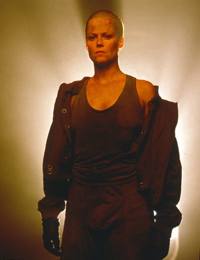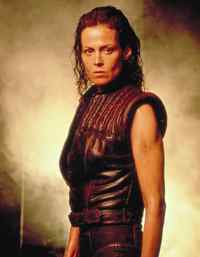This is part of a series of blogs about influences on Dark Land Light House.
[N.B. this posts includes a few minor spoilers about the Alien film series]
DLLH is definitely existential science-fiction rather than space opera. I’ll happily leave the intergalactic warfare and er, trade negotiations to JJ Abrams and Rian Johnson (…FOR NOW). In fact, the sort of questions DLLH is asking about how we understand ourselves as individuals in relation to other human beings, family, time and information probably sit more within a literary tradition of sci-fi than a cinema one – though there are plenty of films that do this of course, and increasingly so within the genre.
But that’s not to say that we want DLLH to feel intellectual – quite the opposite in fact. Back in 2013, when we were making Supernova – which I guess was an early test of the atmospheric world of DLLH – we read that Samuel Beckett had said about Not I, that he hoped the piece would “work on the nerves of the audience, rather than its intellect.” Now obviously those two things are not mutually exclusive, but we refer to Beckett’s quote a lot in relation to DLLH – to describe how we hope the ‘felt’ sense of the show will contribute to how an audience understands and becomes involved with the story and ideas.
This straight up desire to create something that is emotionally compelling as well intelligent is also no doubt a reaction to the oft-made criticism that sci-fi as a genre is technology-fixated, detached from reality and primarily suited to emotionally stunted young men. Now obvs I don’t buy into that because (obvs) I’m a massive sci-fi fan and know how broad and socially and politically inquisitive a field it is. Also, I’m a woman (obvs). But in the same way as I spend loads of time arguing that theatre is not just posh folk shouting in long shot; or that live art isn’t just hipsters in underpants talking about themselves; I get that there’s some work to do on behalf of sci-fi too. So I’m calling DLLH existential sci-fi. Watch me.
Particular influences: 2001: A Space Odyssey, Alien, La Jetee, Stalker, Moon, Star Maker and Solaris (I’m as much a fan of the Soderbergh version as the Tarkovsky one. And I’ve not yet read the book)
We’ve also used Alien as a reference point in relation to our central character of Teller Ghent. It was important to us that Teller was a woman. It’s interesting to see how Ellen Ripley transforms through the film series. You could argue that she gradually becomes more masculine through the first three films, before becoming hyper-female in Alien Resurrection, when she’s got Alien DNA in her.

Aliens
I’m interested in these different versions of the ‘hero’ Ripley and what they say about perceptions of the ‘hero’ woman (increasingly masculine) and ‘superwoman’ (part monster). At any rate, it was really important to us that we gave Teller agency over her own decisions in DLLH. There’s definitely an exploration in DLLH of idea that the way we make our choices has impact on the way we understand the outcome of those choices.
With all these stories though, there’s a sense of human beings pushing beyond the edges of their known experience and encountering things they do not understand. The sometimes mysterious, sometimes tragic, sometimes euphoric consequences of those transgressions and encounters is where the story is at.




